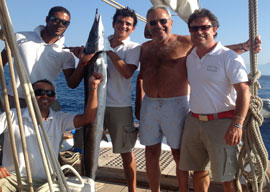
August 16, 2013

Taki and the Weatherbird crew with fish
ONBOARD THE WEATHERBIRD OFF THE PELOPONNESE—The old girl groans and creaks as we tack time and again, the breeze right on the nose as we negotiate the turquoise coastline. She’s gaff-rigged and good upwind, the only annoyance being the ubiquitous speedboats driven by fat Greeks who come by for a look-see. From my porthole I see only green pines and olive trees with the light blue of sky and sea as background.
My maternal house near Sparta is now a museum, the main square named after my grandfather who is among the very few public figures not to have robbed the place blind. Greek hacks are among the most illiterate in an illiterate profession, having mistaken me for another whose name sounds like mine but who doesn’t dress at Anderson & Sheppard and whose last mistress resembled la tricoteuse.
This poor slob was accused of being a Nazi Holocaust denier by lefty rags after what I wrote in these pages two weeks ago. A catamite by the name of Alexis Tsipras, leader of the main opposition party and referred to by everyone as the next prime minister, went on record calling me—or rather the other poor slob he mistook as yours truly—a Nazi racist. It was all great stuff and indicative of what journalism and politics are like in the birthplace of selective democracy. Blame the wrong guy, and once caught with the hand in the kitty, use words such as “Holocaust,” “racism,” “Nazi,” and “fascist” to make up for the gaffe.
In the meantime, I’m cruising and having the time of my life. My annual birthday party went off fine, the Greek royal family honoring me with their presence along with some very, very good friends. The less said about the hangover the next morning, the better.
Weatherbird is full of ghosts. The first night the mother of my children as well as my boy saw a tiny figure in white walking through the cabins below decks. I didn’t believe them until I saw my five-year-old granddaughter sleepwalking in her little white dress; at least I thought it was her.
Real ghosts or not, Gerald Murphy’s presence is everywhere, and he remains as in life a Candide-like figure in that his soul remains pure. As is the trap of the “good life,” fame, fortune, and beautiful women. There are essays and essays on the Murphys onboard, some of them touching on the “dark” side of their glamorous life. Notes on the correspondence between Papa Hemingway and Gerald Murphy concerning the former’s marriage to Hadley and his leaving her for Pauline show Papa’s suspicious and judgmental nature. Gerald had praised Papa and Hadley’s union while in Pamplona—“You two children grace the earth”—but after Papa’s first success with The Sun Also Rises and abandonment of Hadley, Gerald’s letters to him included “Act sharply and clearly” and hinted Hadley had become “miscast” for the role as guardian of Papa’s talent. Hemingway thought Gerald had gone too far in assuming about his personal life and decided Murphy was a dandy who could not be trusted.